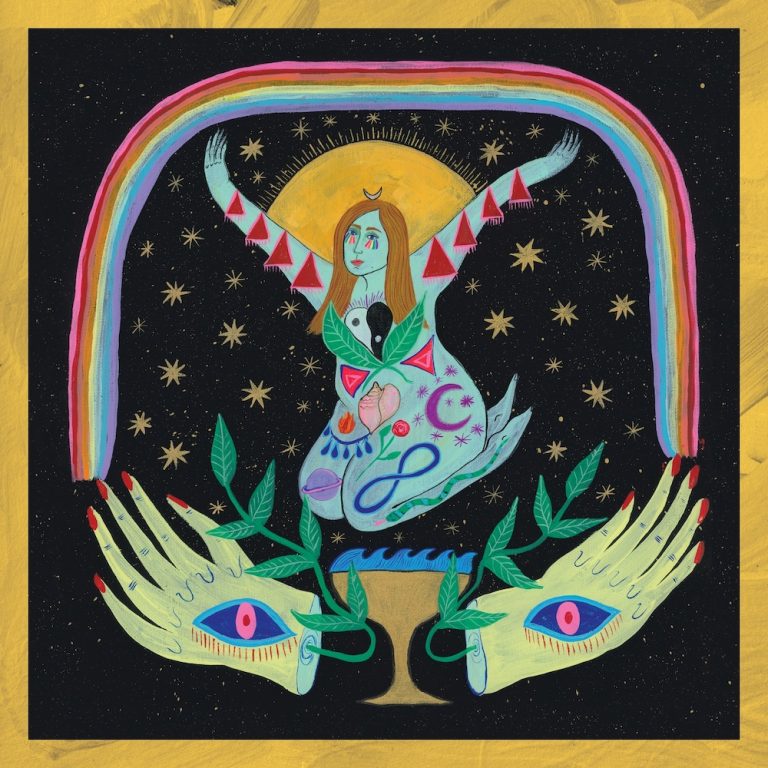From the outside, jazz can seem like one of the hardest areas of music to penetrate. Filled with odd time signatures, solos that can stretch on for seemingly aimless minutes, and revered by gatekeeper-like fans who have an encyclopedic knowledge of which drummer played with which specific band during which specific recordings, it can seem daunting to even approach the thought of ‘getting into jazz’.
While Yorkshire-bred, London-based multi-instrumentalist and band leader Emma-Jean Thackray is undoubtedly a student and disciple of the genre’s history, the music she makes is intended to be approachable to all. Jazz at its core, her sound also shows off her appreciation for the likes of Madlib and Jay Dilla, while also featuring vocal hooks that bring an emotional connection and pop sensibility.
Unity is the key theme of her debut album, Yellow. While it’s a topic on which many musicians are currently building their own brands, it makes more sense in a band like Thackray’s – featuring drummer Dougal Taylor, pianist Lyle Barton and tuba player Ben Kelly, among many others – where they each get to show off their individual skills, but are most impressive when they come together into a united sound. Opening track “Mercury” is a testament to this, as the band spend the opening four minutes each splashing around and making themselves heard, creating an abstract sound. But, as Thackray’s voice makes its entrance to the album, they come together to support it, and out of this mass comes a single and strong message: “To listen is to know, and to know is to love.” It’s the mission statement of the record, and one that’s reinforced – instrumentally and lyrically – throughout.
Thackray has said that Yellow is meant to “simulate a life-changing psychedelic experience”, which is an idea that will turn on some and immediately put others off. However, if you are not au fait with mind-altering drugs, be assured that the enhancing substances on Yellow are simply music and being alive. (If you happen to have any others, that’s a bonus that’ll pair nicely, but are not necessary for enjoyment.) There are certainly hippy-ish mantras throughout, but whether praising the sun, telling you to open your third eye, or offering a hymn for peace and love, Thackray and her band are never trying to impress upon you any belief beyond love for your fellow life forms.
Instead, Yellow is largely about self-actualisation, and the role that community can play in aiding that. Lead single “Say Something” is an anthem of self-belief, and one of many instances where Thackray effectively pairs powerful, dextrous playing with simple but effective messaging. “Don’t just think / say something” she and her backing singers repeat over danceable, house-like rhythms, massaging the message into your cortex. Recent single “Our People” is another great example, the idea of “we are all our people” getting raised atop a mass of rippling playing to a place where it stands out like a message of pure truth handed down from on high.
Most of the time though, Thackray and co are just here to have fun and make you dance. “Venus” is sheer joy, keys and strings bouncing in unison over dizzying percussion, each player able to show off their virtuosity, before all being rolled into a morass of music that practically impels you to join in the conclusive gang vocal “I call to Venus in the sky / she shows me love!” Following that comes the P-Funk-esque “Green Funk”, where she demands “won’t you give me the green funk” – and, even though we don’t know what that could possibly be, Thackray and her band make it sound like something we need to immerse ourselves in immediately; spirals of brass flying off in all directions while bubbling below is a veritable jacuzzi of tones. “Third Eye” is such a bright beam of unified sound that it could force open the invisible eye of any non-spiritual curmudgeon.
Thackray proves herself a master of mood too, taking things down to an intimate level for “Golden Green”, where a teasing bass and sparkling keys wrap us in a cozy atmosphere, ready to cuddle up with whoever we’re feeling close to. Although, perhaps it’s a misdirect, bringing us in close so she can open up on the following “Spectre”. By far the most personal song on the record, it finds Thackray discussing her depression, anthropomorphising it as the titular “Spectre” while the band animate its ghostly movements in spooky hues, while still showing off the vivacity of their musicianship.
As was intended, Yellow is an album of elemental joys and unity. It’s taking what is inherently a complex form of music – and is still highly technical in the hands of these players – and makes it into something for all to enjoy. It’s the kind of album that ‘purists’ will possibly scoff at for its accessibility and poptimism, but you get the feeling that Thackray wouldn’t want them as fans anyway. All she wants from her listeners are open ears, open hearts and open minds. If you have those, Yellow is a one way ticket to feeling good about life and humanity, for a change.

